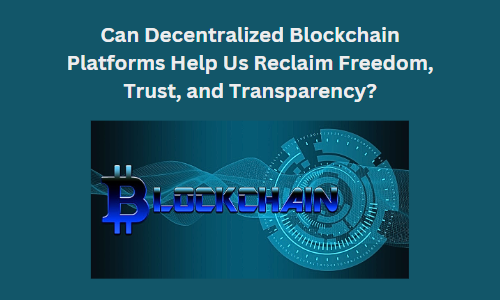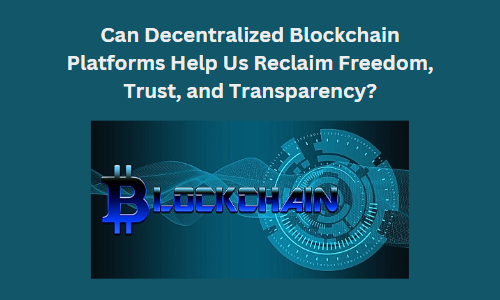


In an era marked by rising concerns about privacy breaches, centralized control, and opaque systems, many of us feel like we're living in a world that’s increasingly broken. Freedom seems to be eroding, trust in institutions is dwindling, and transparency feels like a distant ideal. But amidst these challenges, a technological revolution is quietly unfolding. Blockchain platforms, with their promise of decentralization, are offering a beacon of hope. Could they be the key to reclaiming our control and revolutionizing the way we live?
Today, our digital lives are governed by a few powerful entities. From tech giants that harvest our personal data to financial institutions that control our money, centralization has seeped into every facet of our existence. This centralization breeds a lack of freedom, as we become increasingly dependent on entities that hold the reins to our data and resources. Trust is compromised when these entities operate behind closed doors, and transparency becomes a mere buzzword rather than a reality.
For example, consider how social media platforms monetize our data. They harvest our personal information, sell it to advertisers, and manipulate content without our clear consent. The result? A pervasive feeling of vulnerability and a growing distrust in these platforms.
Blockchain technology offers a radical departure from this centralization. At its core, blockchain is a decentralized ledger that records transactions across a network of computers. Unlike traditional systems, which rely on a central authority, blockchain operates on a distributed model where no single entity has control over the entire network.
Decentralization is the foundation of blockchain's promise. By spreading control across many nodes, blockchain eliminates single points of failure and reduces the risk of corruption. Every transaction is transparent and immutable, meaning it’s visible to all participants and cannot be altered once recorded. This fundamental shift offers a potential solution to the problems of freedom, trust, and transparency.
Imagine a world where your personal data isn’t controlled by a handful of corporations but rather by you alone. Decentralized platforms such as decentralized finance (DeFi) and decentralized social networks offer this possibility. These platforms enable users to interact directly with each other, bypassing traditional intermediaries.
For instance, in decentralized finance, individuals can engage in lending, borrowing, and trading without relying on traditional banks. This not only provides greater financial autonomy but also democratizes access to financial services, especially for those underserved by traditional banking systems.
Similarly, decentralized social networks offer a space where users control their data and are not subject to arbitrary content moderation by a central authority. Projects like Markethive and Steemit are examples where users own their data and have more control over their online interactions.
Transparency is another area where blockchain excels. Every transaction on a blockchain is recorded in a public ledger that anyone can access and verify. This creates a level of openness that traditional systems often lack.
Consider supply chain management, where blockchain can trace the journey of goods from production to delivery. By providing a transparent record of every step in the supply chain, blockchain can enhance accountability and reduce fraud. Consumers can verify the authenticity of products, while companies can ensure that their supply chains are ethical and sustainable.
In voting systems, blockchain could potentially eliminate election fraud and increase voter confidence. With a blockchain-based voting system, every vote is securely recorded and publicly verifiable, ensuring that the results are accurate and tamper-proof.
Despite its potential, blockchain technology is not without challenges. Scalability remains a significant hurdle, as blockchain networks can struggle to handle large volumes of transactions quickly. Adoption barriers also exist, including the technical complexity of blockchain platforms and resistance from established institutions that might feel threatened by decentralization.
Moreover, while blockchain can enhance transparency, it does not automatically solve all security concerns. The technology itself is secure, but the applications built on it can still be vulnerable to attacks and misuse.
Despite these challenges, the potential for blockchain to transform our world is immense. Innovations are continuously emerging to address the limitations of current blockchain technologies. For example, advancements in layer-2 solutions and sharding are working to improve scalability.
For ordinary individuals, getting involved with decentralized platforms can be both empowering and revolutionary. Whether it’s participating in a decentralized finance project, supporting blockchain-based social networks, or advocating for transparency in voting systems, there are numerous ways to engage with this technology.
Blockchain technology offers a promising path forward in our quest for freedom, trust, and transparency. By decentralizing control and making systems more transparent, blockchain has the potential to empower individuals and foster a more equitable and open society.
As we navigate the complexities of this new technological landscape, it’s crucial to remain informed and engaged. The decentralized revolution is not just about technology—it’s about reclaiming our autonomy and shaping a future where power is more evenly distributed and trust is restored.
Disclaimer: This article is provided for informational purposes only. It is not offered or intended to be used as legal, tax, investment, financial, or other advice.
